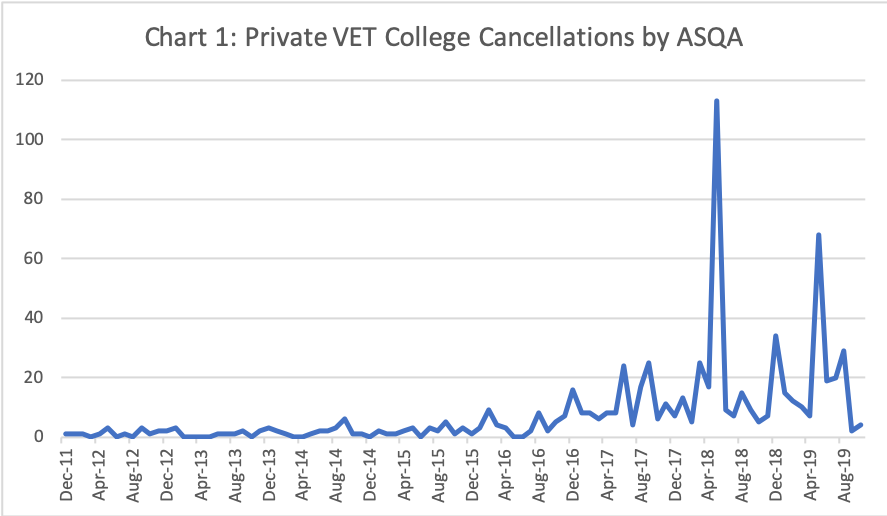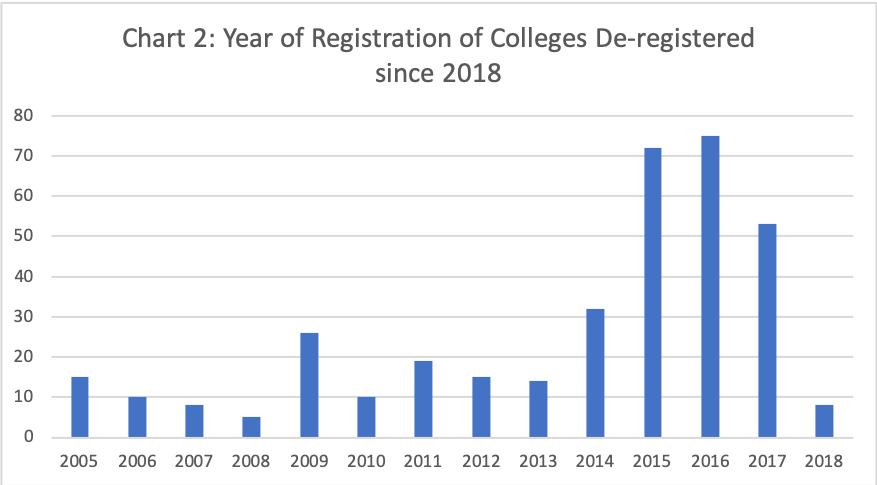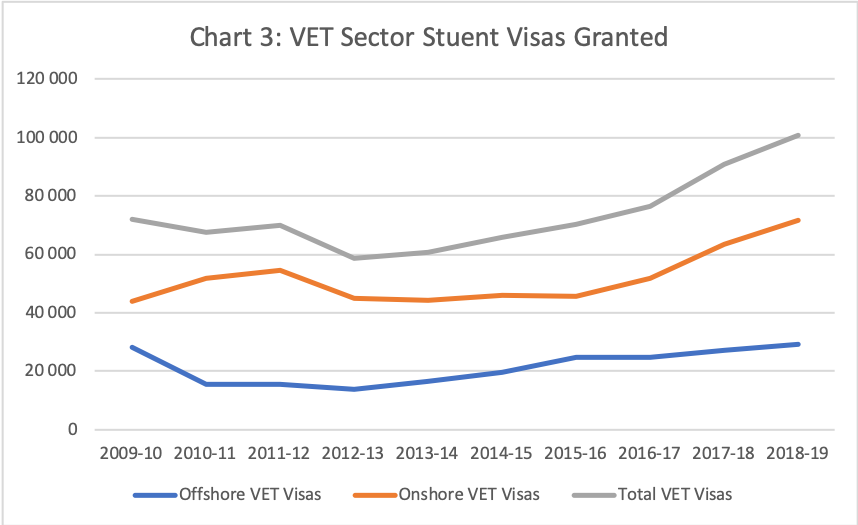ABUL RIZVI: Re-emergence of Dodgy VET Colleges
Dec 12, 2019Since January 2018, the Australian Skills Quality Agency (ASQA) has cancelled the registration of around 450 private VET colleges. This is after years of such cancellations being relatively rare. A spokesperson for ASQA has said this reflects an improved “ability to better target regulatory activities on providers demonstrating the highest risks to VET in Australia”. But what does this mean for the merits of qualifications issued by these colleges?
Chart 1 indicates the number of private VET college cancellations since December 2011.

Source: ASQA websiteWhile some of these cancellations appear to be ASQA doing housekeeping to cancel the registration of colleges that are no longer operating, the bulk of cancellations in the last two years relate to colleges that were established from 2014 onwards (see Chart 2).
The ASQA spokesperson said this reflects “increases in critical and serious non-compliance findings over the past few years. This does not mean that the sector is becoming less compliant, rather that ASQA has developed better methodologies to target providers that represent the highest risks”.
A significant portion of the cancellations are likely to reflect actions taken after closure of the much rorted VET-fee help program three years ago. The VET-fee help program cost taxpayers $7.5 billion between 2009 to 2016. The Age reports that most of the money went to private colleges rather than public TAFE. The ACCC is pursuing significant penalties against a large number of private VET providers. However, it appears numerous private VET colleges have avoided being held to account by going into liquidation.
ASQA advises that 97 of the private VET colleges that had their registration cancelled since January 2018 were also registered to deliver courses to overseas students. The ASQA spokesperson said “common areas of non-compliance for CRICOS providers that may lead to cancellation include lack of rigour in assessment, lack of access to suitable resources and failure to monitor attendance and/or course progression of overseas students”.
But why would such a large number of private VET colleges be registered in the period 2014 to 2017 and then have their registration cancelled from 2018?.

The ABC’s 7.30 Report recently showed an Australian Federal Police raid on a private VET college that was allegedly operating like a ‘visa shop’. These ‘visa shops’ have afflicted Australia’s private VET sector since the late 1980s.
The business model for these colleges is that an entrepreneurial type will set up a private VET college and secure registration on the Commonwealth Register of Institutions and Courses for Overseas Students (CRICOS) to be able to recruit overseas students to undertake one or more VET courses.
The college will often have minimal space or equipment for actually holding classes or delivering any sort of education – this saves on costs. It will recruit overseas students, usually students who are already in Australia perhaps undertaking a higher education course, on the basis of much lower tuition fees and a promise not to report the student if they do not turn up to classes but to record they attended anyway. Keeping the books up to date is important if the college is audited.
This gives the student more time to work and at the end of the ‘course’ the student receives the relevant ‘qualification’.
These ‘visa shops’ represent an old business model that Australians would have the right to think could not recur because of the extensive legislative and monitoring framework now in place compared to the 1980s.
So why the surge in registration of such colleges from 2014?
Given we have understood how these dodgy colleges work since the 1980s and have developed extensive legislative and administrative mechanisms to prevent their re-emergence, how could the Government have allowed this to recur at such a scale?
The Government’s announcement that it would implement the recommendations of the Knight Review (announced by former immigration minister Chris Bowen and largely implemented under former immigration minister Scott Morrison) to streamline student visa processing appears to have been a signal for more of these colleges to set up.
It was associated with a surge in VET student visas granted, particularly to students who initially entered Australia on another visa type (see Chart 3). As at end June 2019, there were almost 150,000 overseas students undertaking a VET course (DHA Student Program Report).

It is likely the private VET colleges that have had their registration cancelled in the last two years may have recruited many thousands of overseas students. The Department of Home Affairs did not respond to queries about the number of students who attended these colleges on a student visa.
The cancellation of the registration of such a large number of private VET colleges raises a number of serious questions:
- How many students obtained qualifications from these de-registered colleges? How many of these students are still in Australia on other visas?
- How many students were attending these colleges when the colleges’ registration was cancelled? What happened to these students? Did they move to other VET colleges?
- What advice is being provided to skills assessing authorities, state/territory governments and employers about the merits of qualifications provided by these colleges, especially as the Government is now encouraging:
- overseas students with VET qualifications to apply for its new regional visas based on sponsorships by state/territory governments or regional employers; and
- more Australian students to undertake VET courses.
- Has ASQA’s decision-making to cancel registrations been robust or will a significant number of these decisions be over-turned at the AAT? That would only increase the chaos.
- With the proposed privatisation of the visa processing platform and automation of processing of various visa types, how will processing of visa applications by students relying on a VET qualification from these colleges be managed? For purposes of further visa applications, will DHA accept VET qualifications obtained by students who attended these colleges?
There are of course many private VET colleges that provide a quality education and there are many VET overseas students keen to secure a high quality education. But it will be very difficult for the Commonwealth Government, skills assessing authorities, state/territory governments who nominate skilled migrants to settle in their jurisdiction or employers to know with any certainty which students have obtained a genuine VET qualification and which obtained a qualification with little merit.
The reputation of Australia’s International Education industry will take another hit.
The Department of Home Affairs at last responded in September 2019 by tightening student visa processing requirements for students from certain countries. But this was almost 18 months after ASQA’s initial cleanout of dodgy private VET colleges and four to five years after the surge in registration of these colleges.
Why did it take Home Affairs so long to respond? Was it again asleep at the wheel? Why did ASQA register so many private colleges with little education history and few educational facilities only to then have to cancel the registration of hundreds of colleges?
Given we are talking about an important part of Australia’s third largest export industry, these are questions Government must address urgently and honestly.
Abul Rizvi was a senior official in the Department of Immigration from the early 1990s to 2007 when he left as Deputy Secretary. He was awarded the Public Service Medal and the Centenary Medal for services to development and implementation of immigration policy, including in particular the reshaping of Australia’s intake to focus on skilled migration. He is currently doing a PhD on Australia’s immigration policies.




